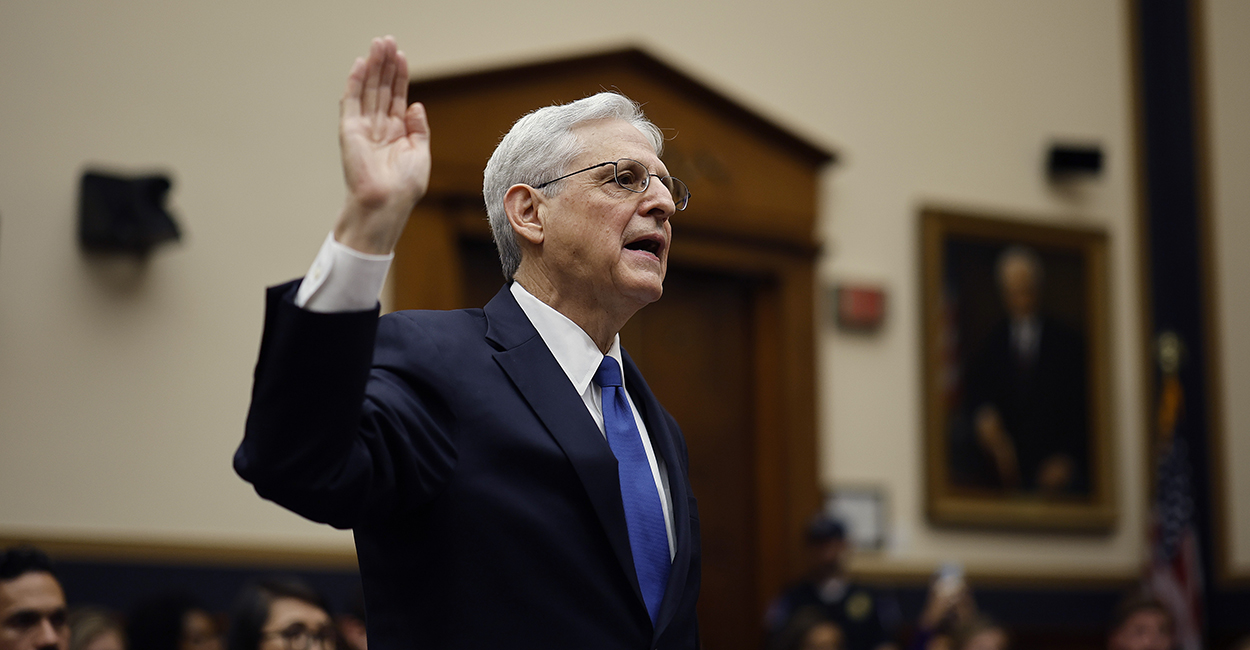
This article was originally published on Daily Signal - Elections. You can read the original article HERE

The House of Representatives recently held Attorney General Merrick Garland in contempt for failing to turn over audio recordings of special counsel Robert Hur’s interviews with President Joe Biden.
Garland, appointed by Biden, refused to provide the recordings.
So the House adopted a resolution June 12 holding him in criminal contempt (making him only the third attorney general to be subjected to such a finding), and referred Garland for prosecution by … Garland.
Of course, the Justice Department refused to prosecute the case—even though it recently prosecuted former Trump aides Steve Bannon and Peter Navarro for committing the same offense, with both being sentenced to prison as a result.
Setting aside the apparent double standard of justice, this scenario highlights a deeper issue related to how Congress may enforce its own institutional prerogatives.
Often, executive branch officials who refuse to provide documents or information invoke executive privilege and, as a result, congressional contempt resolutions go nowhere.
Other than relying on the Justice Department to prosecute criminal contempt of Congress, either the House or the Senate may file a civil suit to enforce its subpoenas.
House Speaker Mike Johnson has said the House will pursue this option against Garland, although such suits often move quite slowly because of the complex issues involved.
And there’s virtually no possibility that this standoff will be resolved before the next election, nor even a guarantee Garland still will be the attorney general when it is resolved. And that’s assuming the courts agree to enforce the subpoena.
If they do and Garland still refuses to turn over the recordings of Biden, the offense would become contempt of court rather than contempt of Congress.
It seems odd for Congress to have to rely on—and be frustrated by—the other co-equal branches of the federal government to vindicate its own institutional interests and to enforce its own contempt findings.
Because many members of Congress—and the general public—have expressed frustration with this seeming inability of Congress to enforce its demands for documents and its concomitant inability to perform oversight and other legislative functions, some are seeking to revive Congress’ long-dormant “inherent contempt” powers.
After all, the criminal contempt statute used today didn’t exist until 1857, and the civil suit mechanism didn’t come into existence until the Watergate era.
It might sound odd to modern ears for the House or the Senate to order its sergeant-at-arms to take someone into custody physically and bring them before the bar of the respective chamber. But historically (at least until the 1930s), that’s how Congress primarily enforced its contempt findings—even after the criminal contempt statute became law.
And the Supreme Court repeatedly has recognized the constitutionality and appropriateness of this approach.
Still, practical problems may persist. Although some high-ranking executive branch officials voluntarily have gone with the sergeant-at-arms after being held in contempt (then-Ambassador William Seward did so in the 1870s), it’s not hard to imagine a scenario where the law enforcement personnel charged with protecting high-ranking executive branch officials—such as the attorney general—refuse to let the sergeant-at-arms anywhere near such an official.
Some have floated a fine as a potential mechanism to enforce findings of contempt of Congress—though this method previously hasn’t been tested and questions remain about whether it would be constitutionally appropriate.
At the end of the day, the best way to give teeth to congressional findings of contempt may be to use the tools the Constitution provides, such as the power of the purse, and to engage in a bare-knuckles political brawl if the sought-after information is important enough and the official’s conduct odious enough.
The main question will be whether Congress has the will, and the fortitude, to see these fights through.
It should.
After all, many on the Left and the Right have complained about Congress abdicating its duties and taking a backseat to the executive branch in important areas.
A more robust willingness to enforce Congress’ findings of contempt might go a long way toward restoring an appropriate balance of power among the co-equal branches of the federal government.
This article was originally published by Daily Signal - Elections. We only curate news from sources that align with the core values of our intended conservative audience. If you like the news you read here we encourage you to utilize the original sources for even more great news and opinions you can trust!










Comments